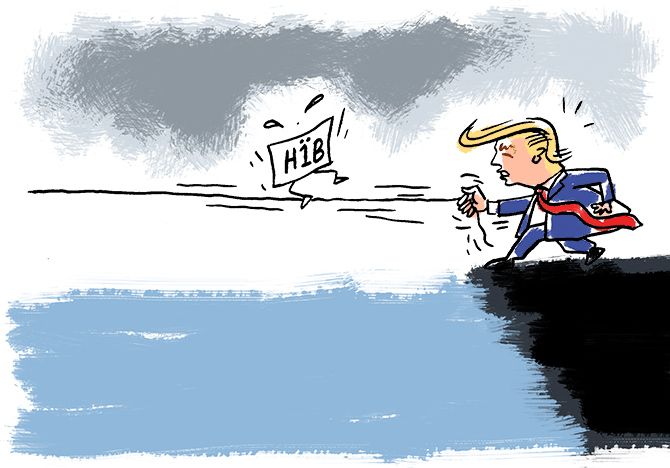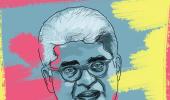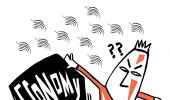The United States has denied one in every fifth new petitions for the most-sought after H-1B visas in 2019 to individuals, with the denial rate higher for Indian IT companies like TCS and Infosys in comparison to American firms, according to a study from official figures.
Illustration: Dominic Xavier/Rediff.com.

The H-1B visa is a non-immigrant visa that allows US companies to employ foreign workers in speciality occupations that require theoretical or technical expertise. The technology companies depend on it to hire tens of thousands of employees each year from countries like India and China.
While the denial rate has dropped slightly to 21 per cent in 2019 from 24 per cent in 2018, the National Foundation for American Policy has said it is much higher for Indian IT companies like Tata Consultancy Services (TCS) and Wipro and very low for American companies like Amazon and Google.
For instance, the denial rate for TCS and Infosys in 2019 was 31 per cent and 35 per cent respectively, whereas for Wipro it was 47 per cent and 37 per cent for Tech Mahindra.
On the other hand, the denial rate for the new H-1B petitions in 2019 was just four per cent each for Amazon and Google. The denial rate for Microsoft during the same period was six per cent, and Facebook along with Walmart was just three per cent each.
“In 2020, the Trump administration is expected to introduce a new H-1B regulation that will make it more difficult for employers to hire high-skilled foreign nationals in the United States," the National Foundation for American Policy said in a report this week.
The issue of H-1B visa has been discussed between India and the US many times in the past.
In February, during President Donald Trump's maiden official visit to India, the issue of H-1B visa was raised and the contribution of the Indian professionals in high-tech sector was highlighted.
In December last year, during the 2+2 dialogue in Washington, External Affairs Minister S Jaishankar stressed on the importance of people-to-people ties, saying they were the defining elements of the Indo-US friendship.
Since 2004, the annual limit of 65,000 H-1B petitions and the 20,000 exemption from that limit for individuals with an advanced degree from a US university has been exhausted every fiscal year. The 85,000 new H-1B petitions allowed each year come to only 0.05 per cent of the US labour force of approximately 164 million.
In addition to higher denial rates under the Trump administration, the United States Citizenship and Immigration Services (USCIS) data shows the percentage of completed cases with Requests for Evidence (RFEs) increased from 22.3 per cent in 2015 to 40.2 per cent in 2019.
According to the report, new H-1B petitions for the top seven Indian-based companies declined by 64 per cent between fiscal 2015 and fiscal 2019.
The seven companies had only 5,428 H-1B petitions for the initial employment approved in fiscal 2019, accounting for six per cent of the 85,000 H-1B petitions for companies (or 0.003 per cent of the US labour force), it said.
Denials may have contributed to this decline but the primary reason for the drop in H-1B visas is a choice by companies to build up their domestic workforce in the United States and rely less on visas, the report said.
In 2018, there was a sharp 10 per cent decline in the approval of the H-1B visas by the US.
The Trump administration has tightened the noose on firms violating H-1B visa rules. President Trump has himself accused many IT companies of abusing the work visas to deny jobs to American workers.
Two years ago, Trump signed the 'Buy American and Hire American' executive order, which seeks to create higher wages and employment rates for US workers and to protect their economic interests by rigorously enforcing and administering immigration laws.
It directed the department of homeland security, in coordination with other agencies, to advance policies to help ensure H-1B visas are awarded to the most-skilled or highest-paid beneficiaries.











 © 2025
© 2025